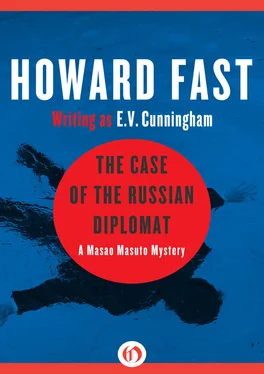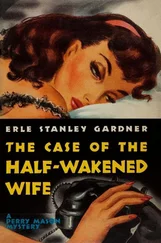Howard Fast - The Case of the Russian Diplomat
Здесь есть возможность читать онлайн «Howard Fast - The Case of the Russian Diplomat» весь текст электронной книги совершенно бесплатно (целиком полную версию без сокращений). В некоторых случаях можно слушать аудио, скачать через торрент в формате fb2 и присутствует краткое содержание. Жанр: Полицейский детектив, на английском языке. Описание произведения, (предисловие) а так же отзывы посетителей доступны на портале библиотеки ЛибКат.
- Название:The Case of the Russian Diplomat
- Автор:
- Жанр:
- Год:неизвестен
- ISBN:нет данных
- Рейтинг книги:5 / 5. Голосов: 1
-
Избранное:Добавить в избранное
- Отзывы:
-
Ваша оценка:
- 100
- 1
- 2
- 3
- 4
- 5
The Case of the Russian Diplomat: краткое содержание, описание и аннотация
Предлагаем к чтению аннотацию, описание, краткое содержание или предисловие (зависит от того, что написал сам автор книги «The Case of the Russian Diplomat»). Если вы не нашли необходимую информацию о книге — напишите в комментариях, мы постараемся отыскать её.
The Case of the Russian Diplomat — читать онлайн бесплатно полную книгу (весь текст) целиком
Ниже представлен текст книги, разбитый по страницам. Система сохранения места последней прочитанной страницы, позволяет с удобством читать онлайн бесплатно книгу «The Case of the Russian Diplomat», без необходимости каждый раз заново искать на чём Вы остановились. Поставьте закладку, и сможете в любой момент перейти на страницу, на которой закончили чтение.
Интервал:
Закладка:
They turned off the freeway at San Fernando Road, and a few minutes later they parked at the police station, an old, battered building in the Spanish style. It was almost six o’clock now, but the summer sun was still high, and the shimmering valley heat was only now beginning to break. The cop at the desk told them that Lieutenant Gonzales was down the hall, second door to the right.
They knocked and entered. Gonzales, a heavy-set, dark-skinned man, had his feet up on the desk. He was smoking a cigar and reading a copy of Playboy . He grinned at Beckman and shook hands with Masuto.
“Still working for the rich?”
“The pay is regular,” Beckman said.
“What brings you up this way? I hear you run a busy little hotel down there, with a drowning and a murder.”
“Already?”
“The news gets around. What can I do for you?”
“Four days ago, someone broke into the Felcher Company and stole four ounces of lead azide. We’re curious.”
“Why?”
“The truth is, I don’t really know,” Masuto confessed. “We’re groping in the dark. We have a situation where nothing connects, and I’m trying to connect it. Maybe it’s a gut feeling more than anything else. What about this Felcher Company?”
“They’re a small outfit on the edge of town, a chemical company that specializes in detonator explosives.”
“Are they clean?”
“As clean as mother’s wash. If you’re gonna fault them on anything, it’s their security system. That stinks. They never had any trouble, so they just coasted along on the proposition that they never would. Not even a night watchman.”
“How did it happen?”
“Someone snipped the padlock on the wire fence around the building and forced a window. No alarm system, would you believe that?”
“I’d believe it.”
“All that was taken were the four ounces of lead azide.”
“Just what is lead azide?” Masuto asked him. “I know it’s some kind of explosive, but what exactly? You don’t hear about it.”
“It’s a son of a bitch. The way it was explained to me, a detonator explosive is sensitive. It goes off easily. And this lead azide is nasty. According to the manager, even a contamination by dust could set it off. Just take a stone and let it drop on this lead azide-bang, off it goes.”
“And what could four ounces do?”
“Blow us out of this room. They tell me that they use a single grain for a detonator.”
“How much is a grain?” Beckman asked.
“Seven thousand in a pound, I think,” Masuto said.
“God almighty.”
“You know, they keep it in a sort of refrigerator, a temperature control room they call it. That’s locked too, and the door was jimmied. And down in the right-hand comer of the door, they scratched the same three letters, J.D.L. The kind of thing you might not even notice if you didn’t look. I couldn’t make head or tail of it, but one of the men at the plant had been reading about this Jewish Defense League, and so that’s how it got into the papers. Me, I just don’t believe in crooks that leave calling cards, and anyway we don’t have no Jewish Defense League here, and when the cops put out some inquiries in L.A., the people in that outfit were as indignant as hell. Funny thing, this stuff is never used as an explosive. The bomb squad in L.A., they don’t come up with anything either.”
“Any leads?”
“Absolutely nothing. Felcher’s a small outfit with only fourteen people working there, and they all come out clean.”
“Yet it had to be someone local.”
“We got only one thing in that direction, and it leads absolutely nowhere. They got nice landscaping in front of the plant and they use a Chicano gardener, name of Garcia. He’s an old guy, and lived here for years and clean, plain, quiet life, never been busted for anything. Every now and then he picks up a kid to help him, mostly Chicano kids. Two weeks ago, this guy asked for a few days’ work. Said he was broke and he’d work for ten dollars a day. He works out a day and then never shows again.”
“Any name?”
“He says his name is Frank. No last name, and Garcia didn’t push. About twenty years old, five seven or so, dark hair, dark skin, dark eyes, maybe a hundred and thirty pounds, and that’s it. No leads, no trace, nobody else seems to remember him. Yeah, he had an accent.”
“Spanish?”
“No. Not Oriental either. Garcia’s sure he wasn’t Spanish. Garcia heard him muttering to himself, and it wasn’t Spanish. You want to talk to Garcia?”
“No,” Masuto said after a moment. “I think you got everything there was to get. Anyway, I have an uncle who grows oranges near here, and I want to see him before it gets dark.”
“Toda Masuto? Is he your uncle?”
“You know him?”
“The real estate guys would like to put out a contract on him. He has some of the best land around. Say hello for me.”
The road to Toda Masuto’s neat white cottage was lined with orange and lemon trees, and when Masuto parked in front of the house, the little old man and his wife came out to greet Masuto and Beckman with a delight that their formality hardly concealed. When the bowing and the exchange of courtesies and the family inquiries were completed, Toda said, “Well, sonny, what brings you here?” He had been born in Japan, but he had only the faintest trace of an accent. Masuto had told Beckman that Toda was past seventy, but he was skinny and vigorous and worked in his groves every day. They sat at a small lawn table in front of the house. Mrs. Masuto had gone into the house and now emerged with a tray containing a teapot, cups and cakes. Toda poured the tea, his eyes twinkling as he looked at the two men.
“Two detectives. Either you’ve come to arrest me, or the real estate trust hired you to beguile me off my land. May I say, with sincere apologies, such is not possible. So very sorry. The land remains in groves until we die. Then my unworthy son, who teaches physics at Stanford, may do with it as he pleases. However, I shall leave the house and two acres of land to your mother, who has always been my favorite sister-in-law.”
“That’s very generous of you, Uncle,” Masuto replied. “But I come merely to talk about oranges.”
“So?” Now he smiled. “You will stay a week perhaps?”
“All my apologies. A half hour at the most. Is the subject so complicated?”
“More than you might imagine. The history of the orange alone could consume hours of pleasant instruction.”
“I recognize the value of such instruction, and I have no desire to be disrespectful, and at another time I shall be honored to listen. For the moment, I seek only to know why the Soviet Union should send five agronomists to Southern California and to Florida to seek instruction in the art of growing oranges. Incidentally, the leader of the group is a Nobel Prize winner, by the name of Ilya Moskvich.”
“The answer is simple.”
“Oh?”
“The Russians do not know how to grow oranges.”
“They have sent spaceships to the moon.”
“Ah, so. Truly. They still do not know how to grow oranges.”
“I find that difficult to believe,” Masuto said respectfully.
“Naturally. You consider the growing of oranges to be a simple matter. You go into the supermarket, you select your fruit, and you buy it. Simple, no? No. In fact, there are only four places in the world where they understand oranges. Actually three. I include Spain, because they are very good at the Seville orange, which goes by the technical name of aurentium . That is the sour orange, which the English are so fond of for their marmalade. But we must also credit the Spanish for rootstock, excellent rootstock, and that is important. Because you see, nephew, all of the finest oranges are budded. This is a process which you might think of as grafting. We select the most excellent strains and bud them onto proper rootstock. But actually the art of growing fine table oranges is confined to three countries-Japan, the United States, and Israel. In Japan they favor the mandarin orange, which they can for export. That, of course, is a generic name. There are many varieties. In Israel, they grow a fine large fruit, which is a variation of sorts on our navel orange, the unique table orange which is distinguished by the small fruit within the fruit. In Israel, as in America, they specialize in the sweet orange, Valencia, navel, pineapple, Washington, Hamlin, juice oranges in Florida, table oranges here in Southern California-those are our favorite varieties, excluding of course the native mandarins-”
Читать дальшеИнтервал:
Закладка:
Похожие книги на «The Case of the Russian Diplomat»
Представляем Вашему вниманию похожие книги на «The Case of the Russian Diplomat» списком для выбора. Мы отобрали схожую по названию и смыслу литературу в надежде предоставить читателям больше вариантов отыскать новые, интересные, ещё непрочитанные произведения.
Обсуждение, отзывы о книге «The Case of the Russian Diplomat» и просто собственные мнения читателей. Оставьте ваши комментарии, напишите, что Вы думаете о произведении, его смысле или главных героях. Укажите что конкретно понравилось, а что нет, и почему Вы так считаете.












